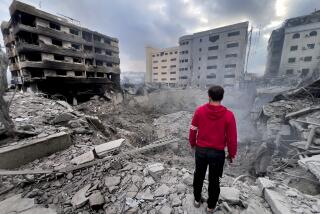Israel Has New Idea of Trio’s Fate
TEL AVIV — For more than a year, the fate of three Israeli soldiers seized by Hezbollah guerrillas on the border with Lebanon has been a mystery. The Islamic movement demanded the release of 19 prisoners in exchange for the men, but refused to say whether the soldiers were dead or alive.
The Israeli army now thinks it knows what happened. On Monday, equipped with what a senior official called reliable and secret new intelligence, the army announced that the soldiers are probably dead and have been since they were ambushed.
“The probability that they are dead is very high,” Maj. Gen. Gil Regev said at a news conference in Tel Aviv. “Until today, we assumed they were alive, and now we assume they are dead.”
Coming in the early days of the 13-month-old Palestinian uprising, the case of the three soldiers heightened tensions at a dangerous time. Violence was spinning out of control in the West Bank and Gaza Strip, and suddenly Israel felt threatened on its northern border as well.
Months earlier, Israel had ended its two-decade occupation of southern Lebanon, a withdrawal certified by the United Nations. But Hezbollah, with backing from Lebanon and Syria, continued to dispute a small portion of land near Shabaa Farms that Israel captured from Syria during the 1967 Middle East War.
Eventually, the soldiers’ case severely strained Israel’s relations with the U.N., which admitted it had withheld evidence about the attack.
Sgt. Maj. Omar Souad, Sgt. Benjamin Avraham and Sgt. Adi Avitan were ambushed by Hezbollah on Oct. 7, 2000. According to reports at the time, the guerrillas fired Katyusha rockets at an Israeli outpost in the disputed area. When Israeli troops arrived at the scene in an open truck, guerrillas fired on them and snatched the three soldiers.
Blood at the site suggested that the men had at least been seriously wounded. Hezbollah consistently refused to disclose their conditions until Israel met its demands: the release of 19 Lebanese prisoners held in Israeli jails.
Regev said the army now believes the injuries were fatal and the three soldiers died immediately or soon after their capture. The army’s chief rabbi, after consulting with other leading rabbis, will decide whether to formally declare the men dead. It is a highly unusual and sensitive matter here to declare an MIA dead.
Regev refused to reveal the nature of the new intelligence. He denied reports that Israeli authorities received body parts. Germany has interceded between Israel and Hezbollah on the soldiers’ fate and may have relayed the new information. German Foreign Minister Joschka Fischer was in Israel last week.
Sheik Hassan Nasrallah, the head of Hezbollah, said on the guerrillas’ Al Manar television station that the Israeli announcement was a trick. He insisted that the Shiite Muslim group will not release information on the missing soldiers until its demands are met.
“We have been committed since the first day of taking the prisoners not to issue any comments or information about the situation of the Zionist prisoners we have, except in return for achieving our rightful demands in this case,” Nasrallah said in a statement also released to news agencies in Beirut.
He suggested as recently as June that the soldiers were alive, but Hezbollah has never agreed to allow workers from the International Committee of the Red Cross to verify their condition.
Relatives of the soldiers were reluctant Monday to accept the army’s news. Tearful and hoarse, Haim Avraham, Benjamin’s father, said he will not give up hope as long as there is a small chance his son survived.
“We still have the hope they are alive,” he said. “But if they are not, they should be here with us, buried in Israel.”
“They gave us information which tells us it’s 90% that they are not alive,” said Amer Souad, twin brother of Omar. “I don’t believe this, because previously we received different information. For an entire year, Hezbollah has been conducting a psychological war, and we don’t believe it. I’m his twin, and I’m telling you, he’s still alive.”
The United Nations’ handling of the case infuriated Israel and embarrassed the world body. It was revealed in June that U.N. peacekeepers stationed in Lebanon had videotaped the scene of the attack a few hours after it took place. The U.N. for months had denied that the tape existed, and it also denied that it possessed other key evidence, such as bloodstained objects recovered from the ambushed vehicle.
Regev said the army will continue to search for the soldiers and bring back their bodies.
Israeli Foreign Minister Shimon Peres lashed out at Hezbollah for the ordeal it has put the families through.
“The behavior of Hezbollah since the abduction reached the very depths of inhumanity,” Peres said in a statement, “contrary to all religious and moral values of the sons of Abraham, and to all norms of universal humanity.”
More to Read
Sign up for Essential California
The most important California stories and recommendations in your inbox every morning.
You may occasionally receive promotional content from the Los Angeles Times.











